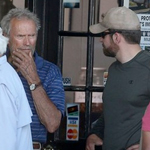 AMERICAN SNIPER is a pretty good movie. I wouldn’t rank it too high in the pantheon of Clint Eastwood directorial works, and it’s definitely not one of the all time great war movies, or even the best movie about the Iraq war. It has some overlap with THE HURT LOCKER without being as effective, in my opinion, either as a thriller or as a character study. And obviously we gotta deduct points for it not being a story about a very old sniper played by Clint. But it’s a very good performance by Bradley Cooper (THE MIDNIGHT MEAT TRAIN), it looks into an interesting world (that of the Navy SEAL sniper), it has several tense battle sequences, and it speaks about the experiences of soldiers with some of the quiet simplicity and understatedness I appreciate in an Eastwood picture. That last part is causing a problem.
AMERICAN SNIPER is a pretty good movie. I wouldn’t rank it too high in the pantheon of Clint Eastwood directorial works, and it’s definitely not one of the all time great war movies, or even the best movie about the Iraq war. It has some overlap with THE HURT LOCKER without being as effective, in my opinion, either as a thriller or as a character study. And obviously we gotta deduct points for it not being a story about a very old sniper played by Clint. But it’s a very good performance by Bradley Cooper (THE MIDNIGHT MEAT TRAIN), it looks into an interesting world (that of the Navy SEAL sniper), it has several tense battle sequences, and it speaks about the experiences of soldiers with some of the quiet simplicity and understatedness I appreciate in an Eastwood picture. That last part is causing a problem.
In many ways it feels different from the rest of Clint’s filmography, but it returns him to one of his favorite themes: the man who has lived a life of violence having a hard time doing something else. Instead of an old outlaw it’s “most lethal sniper in U.S. military history” Chris Kyle (played by Cooper with some extra muscle, facial scruff and Texan drawl), who goes through four tours of duty in Iraq, more than his share, but every time he tries to live a peaceful life with his family he starts itching to be back in combat. It also reminds me a little bit of Clint’s movie J. EDGAR, another biopic of an extreme character that refuses to condemn him. It just presents him, tries to give him a fair shake, shows him as a human, for better or worse.
With most of Clint’s directing-not-acting movies these days (JERSEY BOYS, HEREAFTER, CHANGELING, LETTERS FROM IWO JIMA, etc.) it’s the same routine: a bunch of people say they suck, I see them and like them, but don’t really know many people who bothered to see them, and the world moves on. Even when he does what seems like a crowd-pleasing awards-bait type movie, like INVICTUS, the academies and what not don’t give much of a shit, and Clint doesn’t care that they don’t. Why would he? Who needs another trophy when you wake up every morning and you’re still Clint fucking Eastwood?
But AMERICAN SNIPER is different. It was nominated for 6 Oscars including best picture, and when it went into wide release last weekend it immediately became a smash hit, the biggest opening of Clint’s career. Also, it’s one of those movies that not only sells tickets, but that people apparently like. It has an A+ Cinemascore and an 89% audience rating on Rotten Tomatoes. (His previous three movies as director rated 65%, 45% and 38%).
Most of my critic people I read on Twitter hate the movie and keep making fun of a part where Cooper holds an obvious fake baby (I honestly didn’t notice it, despite advance warning). Regular people who I’ve noticed by clicking on the “American Sniper” trending topic give unqualified raves and mostly say that it is for sure the greatest movie they have ever seen or will ever see by far and that it makes them proud to be American and their heart goes out to the sacrifice and the freedom go back to terrorism if you don’t like it and America forever. That sort of thing. I doubt if you’re reading this in a couple years that it will be considered that important of a movie, but as I write this it’s a big enough deal that various scamps and rascals are trying to turn it into another stupid culture war.
It’s that old condescending page from the Bush era playbook where writers pretend that they’re the Lorax who speaks for the Walmart shopping, beer belly sporting Real God Damn Americans who work so hard and love the flag so much and god damn it they can’t help it if they’re kinda simple and isn’t that really kind of noble though anyway so how dare those liberal media elites with their skinny pants and dijon mustard be so out of touch to turn their nose up to AMERICAN SNIPER or the Kevin James pictures or what have you. Why they always gotta get all thinky about stuff. Go read a book egghead ha ha ha nerds.
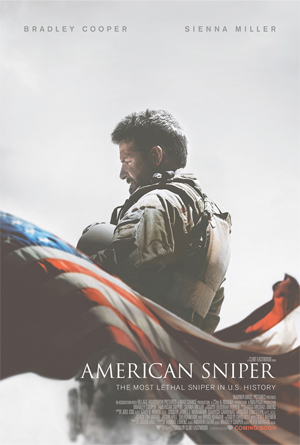 The movie does in fact play to this audience of unhipsters. Cooper as Kyle is completely uncool by movie standards. Sure, his incredible gun skills are cinematic, but at home he wears polo shirts tucked into his light blue Wrangler jeans, Oakley-type sunglasses always sitting on top of his dirty, bent-brimmed baseball hat. He implies he listens to country music (contemporary, I bet), drives a pickup truck, sports a tribal tattoo and his wife calls him “babe.” NASCAR is not mentioned but could be inferred.
The movie does in fact play to this audience of unhipsters. Cooper as Kyle is completely uncool by movie standards. Sure, his incredible gun skills are cinematic, but at home he wears polo shirts tucked into his light blue Wrangler jeans, Oakley-type sunglasses always sitting on top of his dirty, bent-brimmed baseball hat. He implies he listens to country music (contemporary, I bet), drives a pickup truck, sports a tribal tattoo and his wife calls him “babe.” NASCAR is not mentioned but could be inferred.
It is true that some of the anti-SNIPER people can’t relate to a dude like that, and also that they assume the pro side are a bunch of mouth-breathing hayseed nitwits, a stereotype not helped by a wave of dickheads on social media proudly saying that the movie makes them want to go out and shoot [racial slur]s. The other side presents their moronic gibberish as evidence that the movie is some kind of kill-crazy pro-war tract.
If I may make a modest proposal though, I would ask that maybe we not consider the illiterate Twitter boasts of sub-human shitbags to be the definitive interpretations of cinematic art. Like, maybe it’s likely that if you are that bad at writing sentences and conveying the sense of having a human soul that also you aren’t very good at picking up the subtleties in a war drama. In my opinion. And I’m pretty sure they’d have the same review for IRAQ IN FRAGMENTS or something anyway. Or even ALADDIN.
The most disheartening version of this sort of divisiveness I found was a box office report on the websight of a wounded warrior who crowed “It appears that Americans are more interested in honoring the heroes that defend them, rather than wallow in self-hatred over the racial sins of the past. That would explain why AMERICAN SNIPER based on the life of Chris Kyle is smashing box office records, while liberally acclaimed SELMA is floundering.”
In other words, Real Americans would never honor Martin Luther King – a great American hero who gave his life defending freedom – on Martin Luther King Day weekend. I just don’t get these people. When the “we love America” side makes blatantly un-American arguments like this it makes the whole thing so confusing. And why do they think you have to choose between both of those movies? See both of them, goofball. They’re both good. Even if they really were opposing movies (which is ridiculous) I think you can handle checking out opposing viewpoints and considering them for yourself.
Unlike real wars, culture wars don’t leave you traumatized, they just make you act stupid. Here’s the one thing that AMERICAN SNIPER lovers and haters agree on: this movie is nothing but a jingoistic love letter to the killing prowess of elite American soldiers overseas. But they’re both wrong. The thing that’s cool about Clint as a director is his resistance to black and white, good and evil, easy answers and telling you what to think. You have to bring yourself to his movies, so I guess it’s not surprising that people bring their own prejudices. Including me. But I’m right on this one, friends. Hear me out.
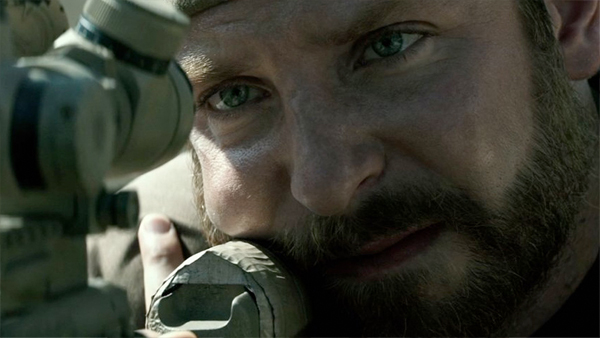
If you’ve seen the trailer, you know the tense situation that opens the movie. Kyle is on a rooftop surveying an Iraqi street in advance of an American convoy. Through his scope he spots a woman and a small boy who seem to be carrying a grenade. He’s talking to people over his headset but no one else can confirm what he sees, so they say it’s up to him. He has to decide whether to believe his eyes, and whether to shoot a woman and a child.
As his finger touches the trigger it jumps back in time, and the first chunk of the movie is about some of the events that brought him there, the formative experiences that made the man who has to make this decision. One is a memory of his dad (Ben Reed, who played a pilot in FACE/OFF) ambushing his sons at the dinner table to sermonize about the world being divided into wolves (bullies and bad people), sheep (passive people who get beat up) and sheepdogs (great awesome warrior types who beat up the wolves to protect the sheep). Apparently this simplistic philosophy is striking a chord with alot of viewers, which is too bad (here’s a good argument against it). But in the movie it’s not treated as necessarily a good idea. It’s well-meaning, but delivered to the boys through terror, with Reed playing it like a crazy man and suddenly slamming his belt on the table as a threatened consequence of wolfiness.
We also see dad bringing young Kyle hunting, teaching him to not feel bad about killing an animal. Once he’s in the military he learns to shoot, but has a harder time on abstract targets than on living things. He’s not so much a good shot as a good killer.
His reason for joining up, according to the movie, is seeing the 1998 Kenya embassy bombings on the news. He’s livid. “Do you see what they did to us!?” This was apparently not a motive for Kyle joining up in real life, but it’s an invented scene that shows this sort of hot-headed, them vs. us, eye-for-an-eye idea of foreign policy. It’s like if Josey Wales joined the Bushwhackers after just hearing about Union guerillas, not having his family killed. I believe it’s Kyle’s brother Jeff (Keir O’Donnell, who was in WEDDING CRASHERS with Cooper) that’s in this scene and looks confused by how personally he’s taking it.
Later Kyle has the same reaction when he sees the burning World Trade Center on TV. He goes right to war… in Iraq. The movie doesn’t note the discrepancy, but shit, I hope some viewers do. That’s one point I actually wouldn’t mind a little underlining on, because it’s sad to think of knuckleheads letting this support their belief in the mythical 9-11/Iraq correlation. But artistically it’s legit. This is clearly what the soldiers were told and what many of them believed, or at least told themselves to make their sacrifices worthwhile.
Kyle always says it’s not about killing insurgents to him, it’s about saving American soldiers. He doesn’t regret the people he killed, he regrets the people he didn’t save. The sheep, I guess. But he also paints the Punisher skull symbol on his vest and vehicles, and refers to his team as “punishers.” So there’s at least a playful idea of being an anti-hero bringing violent vengeance to bad guys. No, not vengeance. Punishment. Life imitates Dolph Lundgren.
So when we come back to Kyle on that roof with his crosshairs on the mother and child it’s clear that this is a simple man with a simple world view being asked to make a difficult, maybe impossible moral and strategic decision. “It’s your call” and “they’ll burn you if you’re wrong,” but even if you’re right you’ll have it on your conscience for the rest of your life. If you’re able to still have a conscience.
Josey Wales never renounced his past, and neither does Kyle. Since the movie takes his point-of-view, and since he wasn’t some Ron Kovic type, it’s not going to preach to us choir members about the senselessness of the war. But there are a bunch of indications that Kyle’s either not equipped or not willing to see the complexity of the situations he’s involved in. When his little brother also enlists and ends up in Iraq Kyle seems terrified for him, but when he sees him heading home shaken up and saying “Fuck this country!” he doesn’t know how to handle it. B-but, but we’re sheepdogs though, man!
When fellow SEAL Marc Lee (Luke Grimes, TAKEN 2) hints at being disillusioned with the war, Kyle immediately puts up a wall. He won’t discuss it with him, I don’t think he’ll even make eye contact. When Lee is killed in combat and it’s revealed that he wrote home about how he was feeling, Kyle angrily tells his wife (Sienna Miller, GI JOE: RISE OF COBRA) that it was the letter that killed him. In his mind he can’t have questions, he can’t think things through, he can’t express his feelings. It would kill him. This is also illustrated through all the homefront scenes, where he repeatedly denies having anything wrong with him and refuses any offers of help even though his blood pressure runs out of control and he’s constantly on the edge of flipping out. Just ignore it and get through it, like getting sprayed with a firehose in BUD/S training.
To me one of the most important scenes is the funeral, where Lee’s mother (Pamela Denise Weaver, ROBOT WARS) tries to read the letter out loud to everyone. This is the only time in the movie where someone tries to articulate an argument against the war. She does it through sobs, seemingly terrified of what people will think of her, but feeling that it has to be done. Everyone at the funeral sits stonefaced, pretends like nothing is happening, except for Kyle, who glares at her through his Wiley X sunglasses. She doesn’t make it to the end, just sputters out and the Honor Guard with their white gloves go right into their impressive gun ceremony. All the questions are washed away by pomp and circumstance.
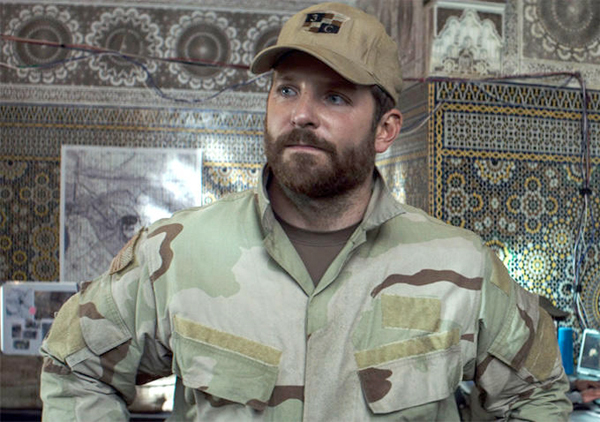
But you can see why people would make assumptions. Since the tagline is “the most lethal sniper in U.S. history” and most articles start out with some variation of “he was credited with 160 confirmed kills but claims 255,” it’s hard not to be reminded of NATION’S PRIDE, the fictional propaganda film from INGLOURIOUS BASTERDS where the Nazis glorified their most prolific sniper. Last week Seth Rogen got people up in arms by pointing that out, but come on, I’m pretty sure we all thought of it. That’s not comparing the ideology of the armies they’re fighting for, it’s just pointing out the weirdness of rewarding our most prolific sniper with movie stardom after that exact thing happened in a fictional movie about Nazis.
But the two movies are very different. In the fake one, the movie-within-the-other-movie, Private First Class Fredrick Zoller (Daniel Bruhl) is like a sniper Rambo, holed up in a tower with swarms of American troops running and firing at him, and he’s just so great that he takes them all out, causing bodies to pile up and fill the streets. They fall off towers, roll off roofs, land on fruit stands.
The Kyle of AMERICAN SNIPER is not Fredrick Zoller or Rambo, he’s an unseen force in the sky backing up the troops. He’s told he makes them feel invincible. But he’s usually hiding in a little hole all day, pissing himself, putting his scope on what could be innocent people, waiting to see what they’ll do. Despite one battle where a superior tells them that the city is abandoned and anyone there is trying to kill them, we don’t see that many shootings of unambiguous bad guys. I’ve read that in the book he brags about some pretty spectacular shots, but thankfully there’s not much here that plays as a show-offy “kill.” I had my suspicions about the sold out Saturday multiplex crowd I saw it with, but nobody cheered or applauded until the end credits. It seems like in most of the scenes where we’re looking through the crosshairs it’s at a woman or a child who he – and we – hope he won’t have to shoot.
In fact there is one scene where he does decide to go Rambo, disobeys orders to get on the ground and join the soldiers in kicking down doors. For about two minutes it makes him seem awesome, but then all the sudden they’re invading the home of an innocent, crying family, slamming old men, women and children against walls and furniture, yelling and poking gun barrels in their faces. Kyle is smart enough to discover a way that the family can get them information, (SPOILER) but this ends up going very, very poorly for the family. Not a good move.
And that’s not the only time Kyle does the awesome movie hero thing instead of the professional, by-the-book one and it ends up being disastrous. In the climax he achieves a seemingly impossible shot, kills his nemesis and avenges his friend’s death all with one slow motion CGI bullet, but again he was going against orders, acting selfishly, and it fucks up the whole operation, leaving him scrambling to clean up an unholy mess without all his friends getting killed. That thing he’s been trying to do for the whole movie is clearly something he shouldn’t have done.
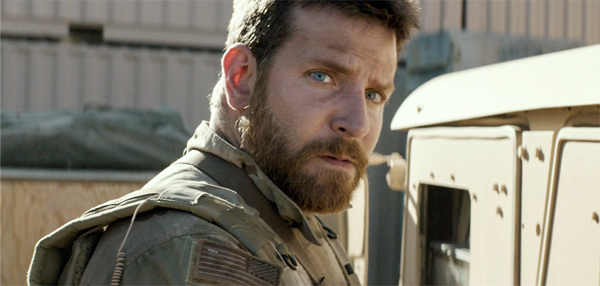
Filmatistically this doesn’t always feel 100% Clint. The opening moves really fast, skips around in time, it seems more energetic and elaborate than he’d usually do, which is fine, it works. A touch that does immediately mark it as an Eastwood directorial work is some minimalistic piano scoring. One of the things I’ve always loved about his movies is his resistance to button-pushing music. He prefers quiet and gentle, sometimes jazzy.
But as soon as he gets to Iraq it’s dramatic stings and buzzes telling you when to be nervous and who’s evil and shit. It’s uncharacteristically manipulative for Eastwood. But at least he doesn’t have a bunch of Hans Zimmer THE ROCK type triumphant themes. The only really fleshed out musical moment is a beautiful piece Ennio Morricone did for the footage of Kyle’s actual funeral procession at the end.
It’s the same with Kyle’s PTSD. In early homefront scenes we notice that if a lawnmower or drill or something turns on nearby he will turn his head, ready for action. No music sting, no dramatic zoom-in, it’s all in Cooper’s performance. I suppose we can give credit to the sound design too, for giving us ambient sounds that, in context, we know seem like potential threats in his mind. But later on it shifts to the traditional method of overlapping combat sounds and dramatic music over the backyard barbecue. Laying it on a little thick. Clint is not usually a laying it on thick guy.
Another example is Kyle’s insurgent counterpart, Mustafa (Sammy Shiek, LONE SURVIVOR, AN AMERICAN CAROL). He too is a legendary sniper known for accurate long distance shots. He was even in the Olympics. But the movie works so hard to make him seem like a traditional movie villain, complete with evil scowl and black headwrap, that when we find out he has a wife and kids and home just like Kyle it didn’t feel like a revelation to me, more like an afterthought. I’m not sure the point lands. Maybe to pull it off Clint will have to go make a better movie from the point of view of the other side, like he did with LETTERS FROM IWO JIMA. I’m sure that would go over well.
One controversy about the movie has to do with whether they’re making too much of a hero out of a guy who, in his book and in later interviews and articles, said some pretty disturbing things about killing. The movie kind of tones down the colorful way he talked and boasted. He calls the people he killed (not necessarily all Iraqis) “savages” a couple times, but doesn’t laugh about killing and say that it’s fun or call himself “bloodthirsty.” He usually seems uncomfortable with his nickname “Legend,” and definitely when a soldier approaches him at a car repair shop and thanks him for saving his life.
Kyle at home is seen solely as a distant, shattered man trying to just be a husband and dad while guilt-ridden about not being in Iraq helping his brothers. In reality homefront Kyle either found time to get into trouble or made up tall tales about it. In the book he tells a story about punching out Jesse Ventura in a bar for loudly criticizing Bush and the war in a bar near the grieving family of a deceased SEAL. Kyle’s friends claim it really happened, but a jury found 8-2 against his estate in a defamation lawsuit filed by Ventura. Another legend about Kyle has him shooting and killing two carjackers, and it being covered up by police who knew about his reputation in the military. Journalists who have looked into this have, thankfully, found it unsubstantiatable and unlikely. The worst Kyle story is the one he told in drunken conversation claiming that he and another military contractor camped out on the Superdome during Katrina and killed dozens of looters. A SEAL friend of his found the idea disturbing enough to report it on his websight, but later removed it when he decided the story wasn’t credible. (After all, wouldn’t we know if dozens of people had been shot?)
I don’t believe it happened, but it’s that he said it that’s relevant here. A Kyle who thinks “I killed a whole bunch of American citizens for trying to steal stuff during a natural disaster” is a cool brag is hard to reconcile with the more reasonable character in the movie. But it does show us that his post-war struggles were no joke and that the commander who told him in the beginning that the three things to worry about are ego, booze and women wasn’t that far off.
This is a group who are psyched to tell Kyle at his wedding that they just found out they’re going to war. I swear I’ve seen that same scenario in another war movie only treated as bad news. These guys are a different breed. But clearly after they come home from all that they have alot to deal with. To me the key to the movie is not what Kyle says, but what he doesn’t say. He acts invincible but come on, look at his eyes in all the stills included here. No wonder he wears sunglasses all the time! He tells his wife he’s fine when he’s clearly not. So when he says he has no regrets about killing people, only about the people he didn’t save, we can decide for ourselves how true that is.
Before I saw the movie I heard a complaint about it not showing Kyle’s death, just mentioning it in text. I thought that sounded like a ridiculous criticism, because it’s based on his memoir, of course it doesn’t have his death. And it was being developed and scripted before he died, he’s even credited as a producer. The confessed killer hasn’t gone to trial yet, and is the only surviving person who saw what happened. More importantly, the murder doesn’t have to be re-enacted for its circumstances to be part of our understanding of the story. We don’t get to see a guy discover Bradley Cooper face down in a shooting range, but that doesn’t stop us from wrestling with what it means that the deadliest sniper in war was killed by a gun back at home, that his idea of therapy for PTSD was to shoot guns, that he tried to protect Americans by killing all those people from a distance and then when he tried to help one without killing he got shot in the back. All those ironies are still part of the context.
But actually I have to concede that the way they handle it in the movie is really awkward. They do partly depict it, they show him leaving for the gun range with his killer, quickly explaining that it’s a guy someone asked him to help with his PTSD. Kyle gets to say goodbye to all his family members and his wife says everything she needs to say to him and he even jokes with his son about taking care of the family while he’s gone. But they barely explain what’s going on and then the title card says “Later that day, he was killed,” blah blah blah. I heard people saying “Whuh?”
Time did a good interview with screenwriter Jason Hall (an actor who was in JACK FROST 2) about his intentions, and he says “I’ve spent time with their son, and that kid is going to grow up without a dad. I don’t want to be the guy who made some f—ing movie where I show his dad getting his f—ing head blown off.” I think he’s right not to show it, but there must’ve been a better way to do it than this.
Despite that misstep I think it’s a pretty effective movie even for those of us who are, as Clint says, “not nuts about war.” I think it’s receiving a bit of the WOLF OF WALL STREET syndrome, that people are punishing it for not coming right out and stating “Yes, here is what you’re supposed to think about all this, in case you weren’t sure.” I mean, I relate more to the people who hate the movie because they think it’s glorifying war than the people who love it for the same reason. And maybe they have stronger morals than me, they’re willing to sacrifice to stop any chance of revisionists pretending that horrible war was justice. But I love movies too much. We’re always gonna have to live with the dipshits. Do we really need to rework all of our movies for their benefit too? I don’t think we should. Fuck ’em.
Near the end there’s a scene of Kyle taking his son hunting for the first time, just like his dad did for him in one of the early scenes that set him up to become a sniper. He talks in awe about “the first time you make a heart stop beating,” like you gotta teach a kid to kill just like you gotta teach him to shave. It seems that after all that he did, all that he risked, all that he has weighing on him, all that it did to his family, he’s perfectly happy to have the cycle start over with his son. I really can’t tell what we’re supposed to think about this scene, but I know what I do think about it. And that’s what movies can do.
NOTE: I spent all week writing this and in the middle of it I saw this great piece by Jason Bailey at Flavorwire that makes some of the same points I did in the first section. So my apologies if some of that was redundant.
UPDATED NOTE: After posting this I listened to the excellent episode of The Q & A Podcast with screenwriter Jason Hall. Regardless of whether you think he succeeded or not it’s a really illuminating look at his intent in writing the movie. I was also surprised to learn that it is not really an adaptation of the book, he approached Kyle and wrote the script before the book was finished. He also has interesting things to say about why he thinks the book doesn’t reflect the real guy.
APPENDIX: Bradley Cooper projects with “America” or “American” in the title
WET HOT AMERICAN SUMMER
OLDER THAN AMERICA
AMERICAN HUSTLE
AMERICAN SNIPER
WET HOT AMERICAN SUMMER (tv series)
AMERICAN BLOOD


























January 26th, 2015 at 1:48 pm
This is easily the best review of AMERICAN SNIPER I’ve read.